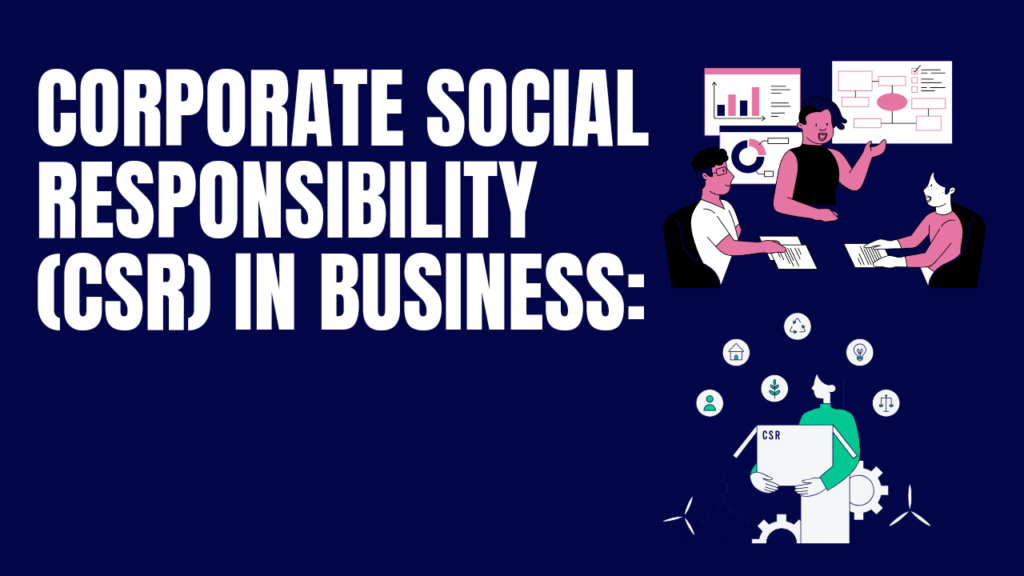CORPORATE SOCIAL RESPONSIBILITY (CSR) IN BUSINESS

Corporate Social Responsibility (CSR) in business refers to a company’s initiative to take responsibility for its effects on environmental and social well-being. Here are some key points you might want to explore when discussing CSR in business:
- Definition and Scope: Define what CSR means in the context of businesses. Explain its scope, covering aspects like environmental sustainability, ethical labor practices, community development, and philanthropy.
- Benefits of CSR: Discuss the advantages of CSR, such as improved public image, enhanced brand reputation, increased customer loyalty, and the potential to attract and retain talent.
- Examples of CSR Initiatives: Explore real-life examples of CSR initiatives undertaken by companies. This could include charitable donations, environmental conservation efforts, fair trade practices, and community development projects.
- Measuring CSR Impact: Delve into methods companies use to measure the impact of their CSR programs. This might involve assessing environmental impact, monitoring community development, or evaluating the social and economic benefits of their initiatives.
- Challenges and Criticisms: Discuss the challenges companies face in implementing CSR initiatives, such as balancing profitability with social responsibility. Address criticisms, too, like accusations of greenwashing (making false or exaggerated CSR claims).
- CSR in Different Industries: Explore how CSR initiatives vary across industries. For instance, the approach taken by tech companies might differ from that of manufacturing or service-oriented businesses.
- Global Perspectives: Investigate how CSR practices differ globally. Some regions might have different expectations or standards when it comes to corporate social responsibility.
- Future Trends: Discuss emerging trends in CSR, such as the integration of CSR into business strategies, the focus on sustainable supply chains, and the role of technology in advancing CSR efforts.
Remember, specific examples and case studies can provide depth and context to your discussion. Feel free to explore any of these points in more detail or let me know if there’s a specific aspect of CSR you’re interested in!
Corporate Social Responsibility (CSR) in business refers to a company’s ethical and responsible approach to conducting its operations and engaging with society. Here’s some key information about CSR in business:
- Definition: CSR involves integrating social and environmental concerns into a company’s business model and operations. It goes beyond profit maximization and aims to make a positive impact on society and the environment.
- Benefits of CSR:
- Enhanced reputation and brand image.
- Improved relationships with stakeholders (customers, employees, investors, communities).
- Attraction and retention of talent.
- Cost savings through sustainable practices.
- Key CSR Initiatives:
- Community Engagement: Supporting local communities through philanthropy, volunteer programs, and partnerships.
- Ethical Supply Chain: Ensuring fair labor practices and ethical sourcing of materials.
- Diversity and Inclusion: Promoting diversity within the workforce and fostering an inclusive workplace culture.
- Transparency and Ethics: Maintaining transparency in business practices and adhering to ethical standards.
- Reporting and Measurement: Many companies publish annual CSR reports to track and communicate their progress in meeting CSR goals. Common measurement frameworks include the Global Reporting Initiative (GRI) and the United Nations Sustainable Development Goals (SDGs).
- Challenges: Implementing CSR can be challenging due to the need for financial resources, potential conflicts with profit motives, and the complexity of global supply chains. Balancing short-term financial goals with long-term sustainability can also be a challenge.
- Examples: Some well-known examples of companies with strong CSR initiatives include Patagonia (environmental sustainability), Microsoft (diversity and inclusion), and Unilever (sustainable sourcing and social impact).
- Regulations and Standards: In some regions, there are legal requirements for companies to report on their CSR activities. Additionally, there are industry-specific standards and certifications related to CSR, such as Fair Trade and B Corp certification.
- Future Trends: The future of CSR may involve greater emphasis on ESG (Environmental, Social, and Governance) factors in investment decisions, increased focus on climate change mitigation, and the use of technology and data to track and improve CSR performance.
CSR is becoming increasingly important in the business world as consumers and investors seek companies that align with their values and contribute positively to society. It’s not only a moral imperative but also a strategic advantage for businesses looking to thrive in a socially conscious world.
Corporate Social Responsibility (CSR) in business refers to a company’s initiative to take responsibility for its effects on environmental and social well-being. It involves integrating sustainable practices
Corporate Social Responsibility (CSR) in business refers to a company’s initiatives to take responsibility for its effects on environmental and social wellbeing. It involves integrating ethical practices into the business model to ensure positive contributions to society while maintaining profitability. CSR initiatives can encompass various areas, such as environmental sustainability, philanthropy, ethical labor practices, and community development.
Businesses engage in CSR for several reasons:
- Enhancing Reputation: Positive CSR activities can enhance a company’s reputation, fostering trust among customers, investors, and the community.
- Meeting Stakeholder Expectations: Customers and investors increasingly expect companies to be socially responsible, and businesses respond to these expectations through CSR initiatives.
- Sustainability: CSR often involves sustainable practices, such as reducing carbon footprint or promoting eco-friendly products, ensuring long-term environmental and business sustainability.
- Compliance and Regulation: Many regions have regulations related to corporate social responsibility.
- Employee Engagement: CSR initiatives can boost employee morale and engagement. Many employees prefer working for socially responsible companies, leading to increased job satisfaction and productivity.
- Cost Efficiency: Some CSR practices, like energy conservation or waste reduction, can lead to cost savings in the long run, making businesses more efficient.
Examples of CSR initiatives include supporting local communities through education and healthcare programs, promoting diversity and inclusion within the workforce, implementing eco-friendly manufacturing processes, and donating a portion of profits to charitable causes.
It’s essential for businesses to align CSR initiatives with their core values and be transparent in their efforts.






